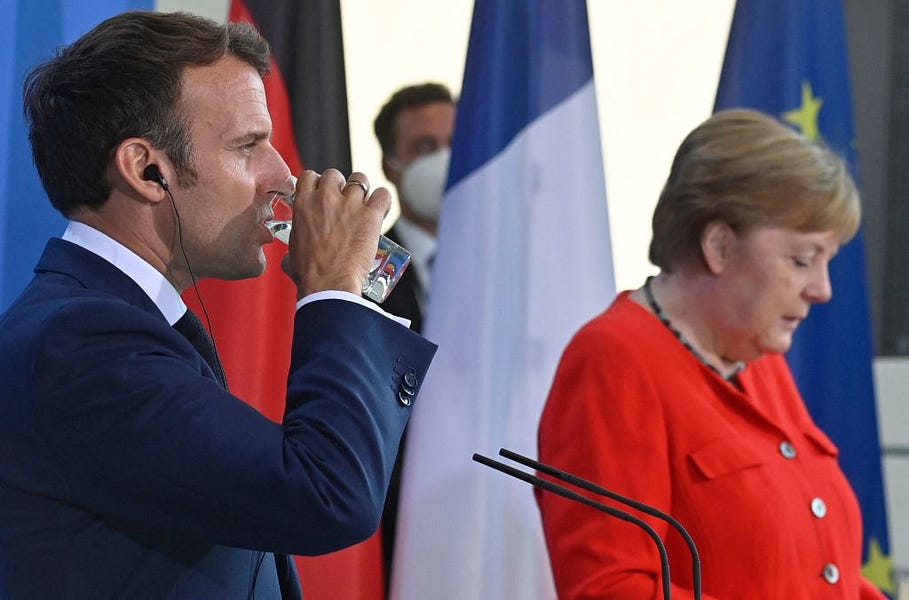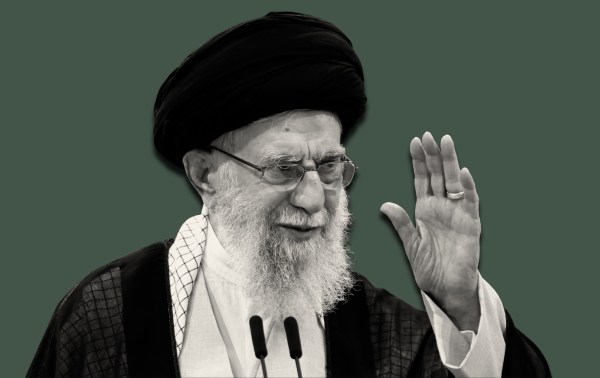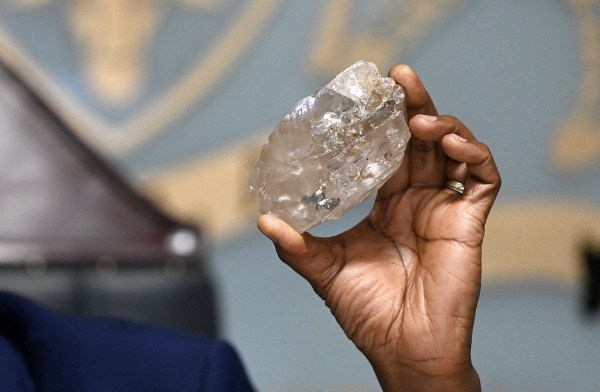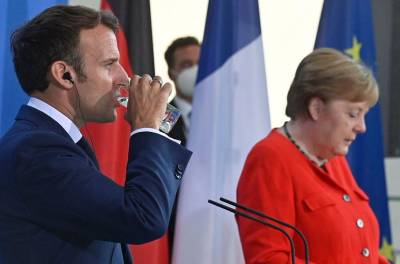One of the downside risks of President Biden’s decision to invite Vladimir Putin to a summit in Geneva was that it created a permission structure for European allies who would want to orchestrate similar meetings with the Russian leader. “If the Americans are taking the initiative to speak to Putin, why can’t Europe?” as one European diplomat told the Financial Times. On Wednesday, the leaders of Germany and France did just that, proposing that the EU hold a summit with Putin. The timing of the overture from Berlin and Paris was less than ideal.
The same day the Germans and French proposed a summit with Putin, Russian vessels and military aircraft threatened a British warship, the HMS Defender, traveling in the Black Sea. The Defender was carrying out a preannounced “innocent passage through Ukrainian territorial waters in accordance with international law," according to the British government. Russia claims these waters as part of its illegal annexation of Ukraine’s Crimean peninsula, rights that the vast majority of the international community reject. Reports vary over whether Russian forces fired warning shots at the British vessel— the Brits flatly deny their vessel was fired upon— but the incident underscores the threat Putin’s military poses to Ukraine, including efforts to prevent access to Ukrainian ports in the Sea of Azov.
To their enormous credit, the Brits— in contrast to the United States, which canceled plans for two warships to enter the Black Sea in April just as Russia was beefing up its military presence along the border with Ukraine— put some muscle behind their support of Ukraine. Their prompt and robust denial that shots were fired also had the benefit of contesting the Russian narrative and effort to dominate the information space.
Instead of an EU invitation to meet with Putin, NATO should convene an emergency session to discuss this latest incident and take a firm stand in support of British efforts. It was just last week, after all, that NATO, in its communique, stated, “We call on Russia to reverse its military build-up and stop restricting navigation in parts of the Black Sea. We also call on Russia to stop impeding access to the Sea of Azov and Ukrainian ports. … We have increased our contributions … on land, at sea, and in the air in the Black Sea region, and we remain committed to its full implementation.”
The German-French initiative for a summit with Putin occurred the same week that European Union leaders are unveiling a joint communication on the EU's relations with Russia, with emphasis on pushing back, constraining, and then, where possible, engaging with Putin’s Russia. In preparation for the presentation, High Representative/Vice President Josep Borrell said: “Under present circumstances, a renewed partnership between the European Union and Russia, allowing for closer cooperation, seems a distant prospect.” European Commission President Ursula von der Leyen added: “The deliberate choices and aggressive actions of the Russian government over the last years have created a negative spiral.”
The German-French proposal undermines those parts of the strategy that emphasize pushback and constraint. Ahead of a meeting Wednesday with visiting Secretary of State Antony Blinken, German Chancellor Angela Merkel said, “However much we argue, we must keep the channels of communication open, so as to be able to clearly express our positions and interests and then look to see if any solutions can be found.” Merkel’s likely successor as chancellor, Armin Laschet, in interview earlier this week with the Financial Times, called for Russia to be brought out of the cold, saying the West must try to “establish a sensible relationship” with Moscow. “Ignoring Russia has served neither our nor the US’ interests,” he said, praising Biden’s decision to meet Russian Putin last week. As one senior EU diplomat was quoted as saying, “We need to have a discussion about how to get away from this negative spiral ... but we need to advance united.” Good luck with that.
The “negative spiral,” to be clear, is the result of Putin’s egregious actions, dating back to his invasion of Ukraine in 2014. Russia continues its pressure campaign against Ukraine, violating the country’s sovereignty and territorial integrity, as the latest incident with the British warship demonstrates.
It also continues to occupy 20 percent of Georgian territory. Putin has stood by Belarus’ dictator Aleksandr Lukashenko, even after the latter’s act of terrorism when he forced down a Ryanair flight to arrest a regime critic. He supports the murderous regime in Syria, where Russian forces have engaged in possible war crimes. Russian agents continue their interference in Western elections and hack and launch ransomware attacks on key targets in the United States, including hospitals, pipelines, and meat processing plants. And the crackdown inside Russia, including against opposition leader Alexsei Navalny, is the worst since the breakup of the Soviet Union.
In the very brief time since Biden met Putin in Geneva, Russia authorities have added Bard College to the list of “undesirable organizations” and Russian National Security Council Secretary Nikolai Patrushev hosted the leader of Burma’s military junta, who has been sanctioned by the United States and other countries. In a June 21 op-ed for the German newspaper Die Zeit, Putin absurdly accused the United States of orchestrating the 2014 removal from power of pro-Russian Ukrainian President Viktor Yanukovych. These, along with the incident Wednesday in the Black Sea, do not bode well for an improvement in relations between Putin and the West and suggest to the contrary that Putin will ramp up his efforts at supporting a kind of Authoritarian International and Authorintern, if you will.
The German-French initiative will divide the EU, with countries closer geographically to Russia resistant to such a loosening of the EU’s approach to Moscow. In fact, opposition of those countries during a June 25 EU leaders meeting appears to have blocked such a summit with Moscow for now, with opposition led by Lithuania, Latvia, Estonia, Poland and Romania.
Neither Germany, destination of the controversial Nord Stream 2 pipeline which many in Europe oppose, nor France appears to have done much checking with fellow EU member states before announcing their desire for a summit. Former Estonian President Toomas Hendrik Ilves was unsparing in his assessment of his former counterparts, tweeting: “Merkel and Macron are either clueless or have learnt nothing from 80 years of history and the nations betrayed by the Germans. Without even talking to other EU countries.”
The EU and Russia have not held a summit since 2014, following Putin’s illegal annexation of Crimea and invasion of the Donbas region of Ukraine. Putin has done nothing to earn a summit with the EU, just as Putin did nothing to warrant an audience with the American president. The United States is in no position, however, to criticize the German-French maneuver given the Biden summit with Putin last week.
Aside from furthering splits within the EU, the German-French initiative will alarm Ukraine, Georgia, Moldova, and other countries in the region subject to Russian aggression. An EU invitation to Putin will raise fears in their respective capitals that fatigue with Russian sanctions is leading EU member states to soften their approach with Putin.
As it is, they were not thrilled that the NATO Summit in Brussels simply reaffirmed a statement from a NATO gathering 13 years ago that said Ukraine and Georgia will become members of NATO. Since that 2008 pronouncement, frustration in both Kyiv and Tbilisi has grown with the lack of progress toward that goal.
One of the best ways for the West to address the threat from Vladimir Putin is through increased support for Russia’s neighbors. President Biden, before he traveled to Europe, called Ukrainian President Volodymyr Zelensky and invited him to Washington for an Oval Office visit next month. When asked whether he supported Ukraine’s membership in NATO, however, Biden explained that that country’s leadership needed to do a better job on corruption and would need to convince the other 29 members of the Alliance that it deserved membership -- not a resoundingly reassuring reply as heard in Kyiv.
Biden also should extend an invitation to Belarus’ democratic leader, Svitlana Tsikhanouskaya, who most observers recognize as the real winner in that country’s election last August; instead Lukashenko stole the election and has launched a vicious crackdown against the population, forcing many Belarusians, including Tsikhanouskaya, to flee to nearby countries. He and G7 leaders missed an opportunity to meet with her in the U.K. earlier this month in what could have been a strong show of solidarity with the people of Belarus and against Lukashenko and his supporter in the Kremlin, and a powerful signal beyond the additional sanctions being slapped on Belarus.
For Georgia, that country hopefully is just starting to emerge from a major political crisis following controversial elections last fall and the February arrest of the main opposition leader, complicating the West’s efforts to demonstrate its support. Still, despite its internal turmoil, Georgia remains the most pro-American country in the region and deserves strong displays of U.S. support. Moldova will conduct parliamentary elections next month, but its pro-Western president, Maia Sandu, should also receive an invitation to Washington once the political dust settles there.
The United States, Ukraine and 30 other nations plan to conduct exercises, Sea Breeze, in the Black Sea region starting next week. Russia will lead its parallel exercises, Zapad, as well. Nobody wants a repeat of what happened with the British warship—or worse—but NATO, led by the United States, needs to take a firm stand. That is not done through endless invitations to and international meetings with Putin as he and his forces ramp up their threat to Russia’s own people, Russia’s neighbors, and to the West. In dealing with Putin these days, emphasis clearly needs to be on drawing strong, clear redlines, not endless engagement. We need more British Defenders and fewer summits with Putin.
Eric S. Edelman is a former undersecretary of defense for policy and counselor at the Center for Strategic and Budgetary Assessments. David J. Kramer, assistant secretary of state for democracy, human rights, and labor in the George W. Bush administration, is senior fellow in the Václav Havel Center for Human Rights and Diplomacy and director of European and Eurasian Studies at Florida International University’s Steven J. Green School of International & Public Affairs. Edelman is a board member and Kramer is an advisory board member of the Vandenberg Coalition.






Please note that we at The Dispatch hold ourselves, our work, and our commenters to a higher standard than other places on the internet. We welcome comments that foster genuine debate or discussion—including comments critical of us or our work—but responses that include ad hominem attacks on fellow Dispatch members or are intended to stoke fear and anger may be moderated.
With your membership, you only have the ability to comment on The Morning Dispatch articles. Consider upgrading to join the conversation everywhere.